This article is a valuable vegan diet and supplement resource for anyone to spend a few minutes reading to check if they are getting all the vitamins needed to avoid health issues. If your diet isn’t complete in all vital vitamins then it’s easy to resolve with a vegan supplement.
If you’ve been vegan for a while you’ll know the first question many people ask is where do you get a certain vitamin for.
While a vegan or plant based diet can provide you with all the nutrients you need, it does take some thought and planning.
It is important to know if your meat and dairy free diet does provide you with all the vitamins and minerals.
There are concerns over the absorbability of supplements and most experts agree that getting them from your diet is better than taking a tablet with synthetic vitamins.
This article does not constitute medical advice, it’s a rough overview guide to check if your vegan diet might be deficient and could benefit from supplementation.
8 Vital Vitamins For A Vegan Diet
These are the 8 nutrients that it’s important to get on a vegan diet and how much you need to eat from foods to avoid supplementation.
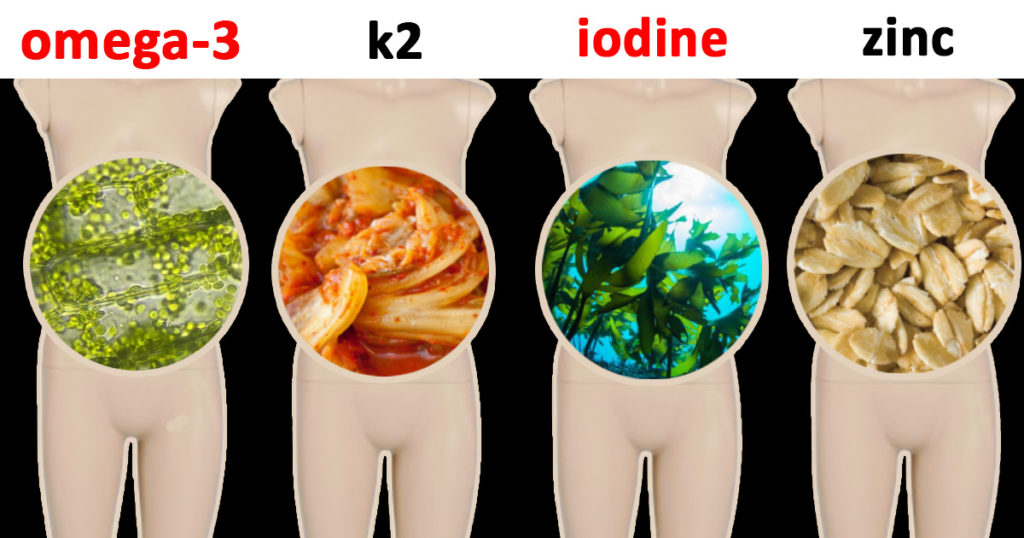
Iodine
Having iodine is vital so your thyroid can produce hormones to control the body’s metabolism.
There’s only two reliable sources of plant iodine; iodized salt and seaweed. Other plant sources do contain iodine but it’s often not in a significant amount or consistent.
An adult needs 150 mcg of iodine a day*.
If you’re vegan and don’t consume 1/2 tsp iodised salt or a few grams of seaweed several times a week you need to supplement for iodine.
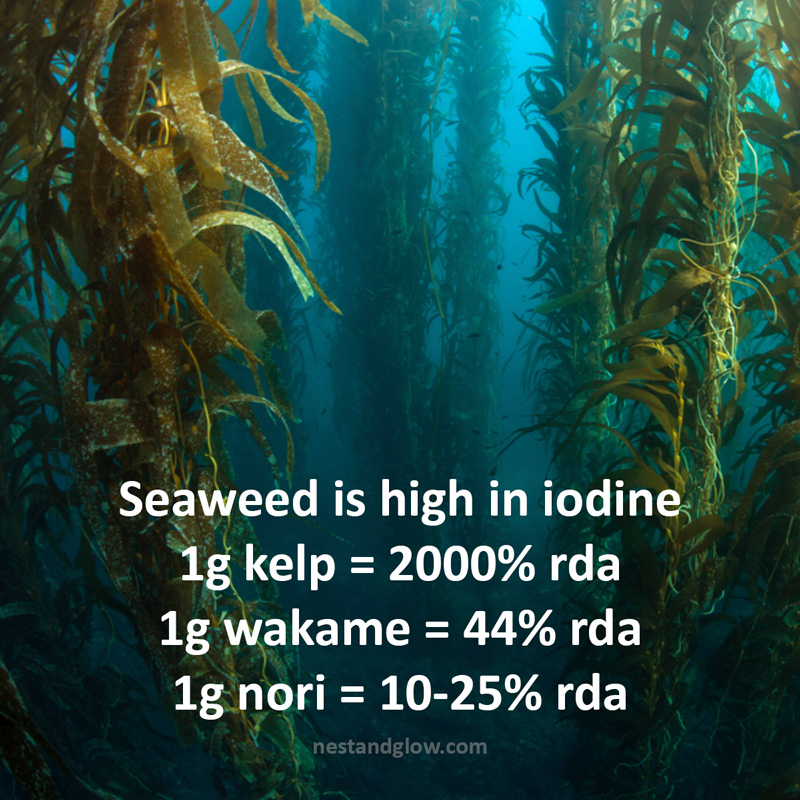
Long-chain omega-3 Fatty Acids
A sufficient amount of Omega-3 fatty acids have been linked to brain health, eyesight and reducing the risk of cancer and depression.
There is only one essential omega-3 fatty acid; Alpha-linolenic acid (ALA) and many vegan foods are high in ALA.
Your body can make the non-essential and vital long-chain omega-3 fatty acids eicosapentaenoic acid (EPA) and docosahexaenoic acid (DHA) from ALA.
EPA and DHA are mostly found in animal products so vegans need to have enough ALA for the body to make the long chain omega-3 acids.
While the human body can create EPA and DHA from ALA the efficiency rate is low at <5-10% for EPA and 2-5% for DHA*.
Microalgae is the only useful vegan source of EPA and DHA, unless you count human milk as vegan but that’s another topic.
The recommended amount of ALA is 1.6g for males and 1.1g for females. For EPA and DHA current recommendations is 0.25g of each*.
Therefore for a vegan diet and the conversion amount of plant ALA you need is approx 3.5g for EPA and 7g for DHA plus the 1.6g for ALA.
That makes a total of 12 grams omega-3 for men and 11.5g for women a day.
Use the diagram below to check if you’re eating enough omega-3 fatty acids on a vegan diet.
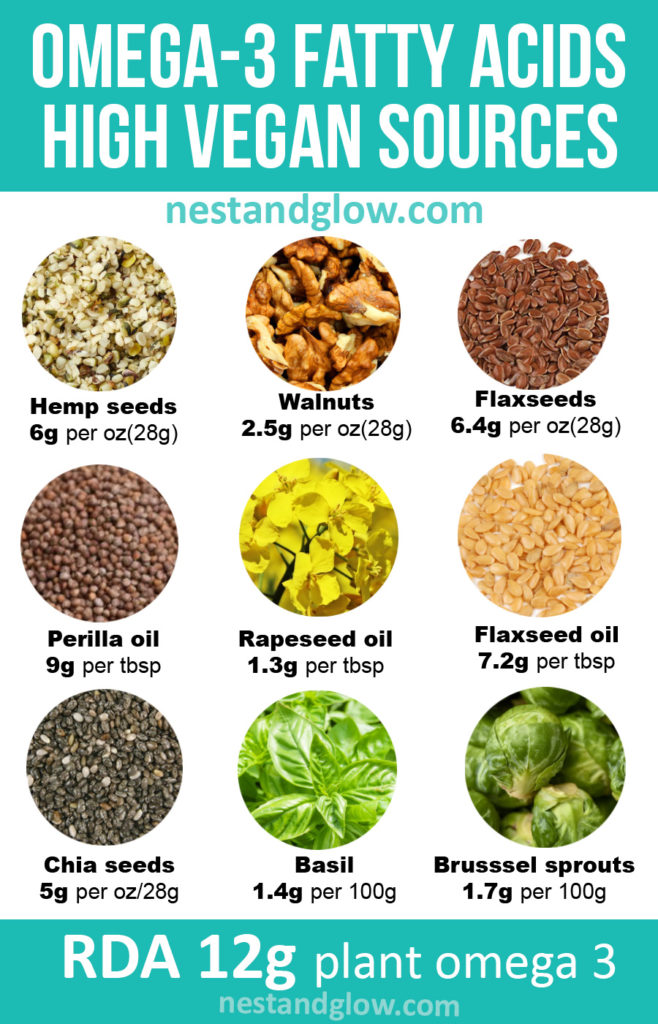
White beans, almonds, spirulina, soybeans, pecans, Brussel sprouts and oats also contain a small amount of ALA that all adds up.
Vegan Long Chain Omega-3 Supplement
If you don’t get enough vegan long-chain omega 3 then you should supplement with Algal oil. This plant oil is unsurprisingly derived from algae and environmentally friendly and sustainable, unlike fish oils.
Iron
There are two types of iron available; heme and non-heme.
Heme iron is from animal sources and non-heme iron is from plants*.
The RDA of iron is 8 mg for men and for women that have reached the menopause. Premenopausal women should aim for 18mg.
The current thought is that plant source iron is non-heme and less absorbed so you should consume 1.8 times the RDA of iron if vegan*. This is subject to change with more research but with this multiplier factored in the vegan RDA of iron is 14.4 mg for men and post-menopausal women, premenopausal women vegan women need 32.4 mg a day.
Iron supplements can be damaging as too much iron can harm you, block the absorption of other minerals or in extream cases cause organ failure. It’s best to get your iron levels checked before supplementing.
Use the image and table below of vegan iron sources to get a rough estimate of if you’re eating enough iron.
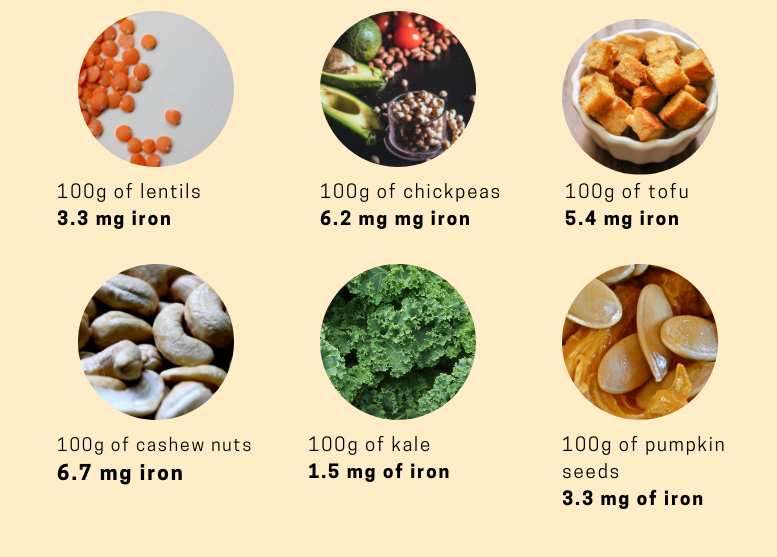
Vegan Iron Sources
| Food | Amount | Iron (mg) |
| Blackstrap molasses | 2 Tbsp | 7.2 |
| Lentils, cooked | 1 cup | 6.6 |
| Tofu | 1/2 cup | 6.6 |
| Spinach,cooked | 1 cup | 6.4 |
| Kidney beans, cooked | 1 cup | 5.2 |
| Chickpeas, cooked | 1 cup | 4.7 |
| Soybeans,cooked | 1 cup | 4.5 |
| Tempeh | 1 cup | 4.5 |
| Lima beans, cooked | 1 cup | 4.5 |
| Black-eyed peas, cooked | 1 cup | 4.3 |
| Swiss chard, cooked | 1 cup | 4.0 |
| Bagel, enriched | 1 medium | 3.8 |
| Black beans, cooked | 1 cup | 3.6 |
| Pinto beans, cooked | 1 cup | 3.6 |
| Veggie hot dog, iron-fortified | 1 hot dog | 3.6 |
| Prune juice | 8 ounces | 3.0 |
| Quinoa, cooked | 1 cup | 2.8 |
| Beet greens, cooked | 1 cup | 2.7 |
| Tahini | 2 Tbsp | 2.7 |
| Peas, cooked | 1 cup | 2.5 |
| Cashews | 1/4 cup | 2.0 |
| Brussels sprouts, cooked | 1 cup | 1.9 |
| Potato with skin | 1 large | 1.9 |
| Bok choy, cooked | 1 cup | 1.8 |
| Bulgur, cooked | 1 cup | 1.7 |
| Raisins | 1/2 cup | 1.5 |
This list is not definitive and many plant foods contain iron in small amounts, so it can add up over the day.
If you don’t eat enough iron you can increase iron in your diet by cooking with cast iron pans or boil an iron lucky fish to increase iron in drinks.
B12
The natural source of B12 in a vegan diet is from unwashed organic fruit and vegetables, however this isn’t reliable and unwashed produce does present other risks.
Fruit and vegetables in the modern supermarket are pressure washed so contains no b12. Organic unwashed produce after being washed at home (without a pressure washer) can contain some b12. But if you’re vegan it’s not advisable to rely on it as a source of b12 as the amount depends on the soil.
Spirulina and seaweed are said by many to contain b12, but although it looks similar under a microscope they actually contain pseudo vitamin B12 which is not the same or a replacement*.
Vegan sources of B12 are found in fortified foods like yeast extract, nutritional yeast and some plant milk.
B12 can be stored for a long time in the body, so as long as you have several sources each week then it shouldn’t be an issue.
It’s recommended that an adult should consume 2.4 mcg of B12 a day. One serving of yeast extract provides 80% of the RDA and many plant milk contains 50% of your RDA in a glass.
Optimum B12 amounts are easily achieved in a vegan diet if you have b12 fortified foods several times a week. Nutritional yeast containing b12 can make a great vegan cheese or high protein vegan cheesy pasta.
However absorption rates can be lower. A B12 supplement is cheap and effective and there’s no harm in having more than the RDA.
B12 Supplements
B12 is often found in multivitamins and stand-alone tablets, but a B12 spray is touted as the best way to absorb the vitamin.
Vitamin D
There are few natural sources of vitamin D in foods so most people regardless of if they’re vegan or not are deficient*.
For most people just 20 minutes in reasonably strong sun can provide enough vitamin D. But with many people wearing sunblock all the time, staying inside and living in locations where there’s not much sun this can be difficult.
It’s indisputable that too many UV rays are damaging and all dermatologists say never expose yourself to the sun, but experts can’t agree if some exposure is good.
Some plant foods are fortified with vitamin D like milk and cereals and now some mushrooms are exposed to UV light to make them contain vitamin D.
If you’re vegan and don’t get regular sun exposure or don’t eat foods containing vitamin D then a vitamin D3 supplement is recommended. Vitamin D3 has been shown to be more effective and absorbed than D2*. May only need to take vitamin d supplements during the winter months depending on your location.
Calcium
This is by far the most controversial and disputed vitamin. I go on the side of caution to take an evidence-based approach.
There are some thoughts that vegans need less calcium and dairy leaches calcium from bones, but more research is needed to conclude this.
Research does seem to suggest that many vegans are deficient in calcium*.
Plant sources of calcium include dark leafy greens (kale, spinach, watercress), blackstrap molasses, chickpeas, chia seeds, sesame seeds, orange, broccoli and white beans.
The RDA of calcium for adults is 1’000 mg and studies have shown people that have less than 500mg are more at risk of fractures*.
Use the diagram below to check if you’re eating enough calcium in your vegan diet:
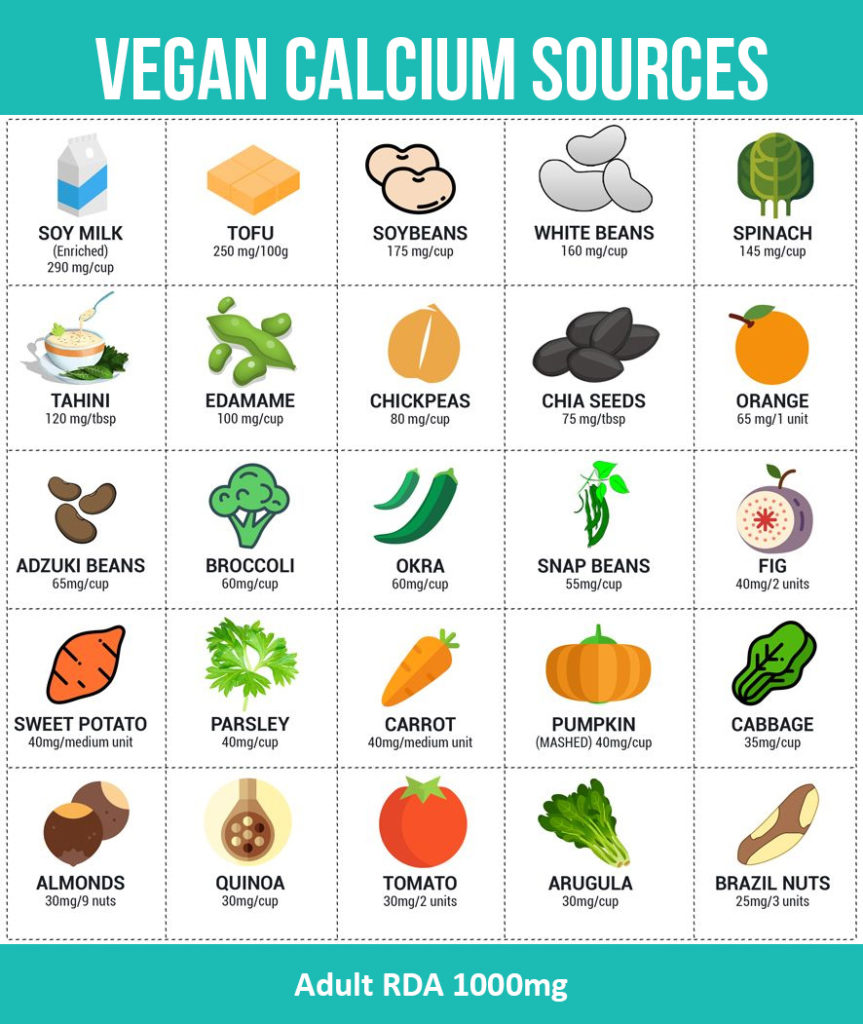
Orange juice has been shown to increase the absorption of both iron and calcium when consumed with a meal*.
Zinc
This important mineral is available in decent amounts in just a few vegan foods.
The normal recommendation is 10mg a day, but because some studies suggest plant sources are not as easily absorbed vegans are recommended to have 15mg a day.
The phytic acid in nuts, seeds and grains prevents some minerals like zinc from being absorbed. You can increase the absorption by soaking and sprouting, like in my recipe for pumpkin seed candy that contains a useful amount of zinc.
Vegan sources of zinc include sesame seeds, pumpkin seeds, cashews, quinoa, hemp, lentil, sunflower seeds, oats, almonds, brown rice.
Use the table below to check if you’re eating enough Zinc-rich plant foods so your vegan diet isn’t deficient.
| Zinc in Plant Foods | |||
|---|---|---|---|
| Food | Preparation | Serving | mg |
| Oatmeal | cooked | 1 cup | 2.3 |
| Tofu | firm, raw | 1/2 cup | 2.0 |
| Cashews | dry roasted | 1/4 cup | 1.9 |
| Sunflower seeds | roasted | 1/4 cup | 1.7 |
| Garbanzo beans | boiled | 1/2 cup | 1.3 |
| Lentils | boiled | 1/2 cup | 1.3 |
| Peanuts | raw | 1/4 cup | 1.2 |
| Almonds | whole | 1/4 cup | 1.1 |
| Pecans | halves | 1/4 cup | 1.1 |
| Tempeh | raw | 1/2 cup | 1.0 |
| Kidney beans | boiled | 1/2 cup | 1.0 |
| Peas | boiled | 1/2 cup | 1.0 |
| Chia seeds | dried | 1 oz | 1.0 |
| Walnuts | chopped | 1/4 cup | 0.9 |
| Peanut butter | 2 tbsp | 0.9 | |
| Corn | yellow, boiled | 1 cup | 0.9 |
| Pinto beans | boiled | 1/2 cup | 0.8 |
| Pistachios | 1/4 cup | 0.7 | |
| Miso | 1 tbsp | 0.4 | |
| Broccoli | boiled, chopped | 1/2 cup | 0.4 |
K2
The plant foods that contain K2 are all fermented. Natto is the highest source of K2 and it’s what’s used to make K2 supplements. This fermented soybean dish can be bought frozen from some Asian shops.
Alternatives source of vegan K2 are sauerkraut, kimchi, kombucha and kefir that all contain K2 as long as they are raw and have not been pasteurised. Most shop-bought versions have been pasteurised so it’s best to make your own with my easy vegan kimchi recipe or raw sauerkraut recipe.
Vitamin K1 is found in most plant foods and your body can turn K1 into K2 but there are some concerns that it may not be practical for vegans to eat enough K1 to make a sufficient amount of vitamin K2.
Bottom line, enjoy some raw unpasteurised fermented products several times a week to ensure you get enough vitamin K2.
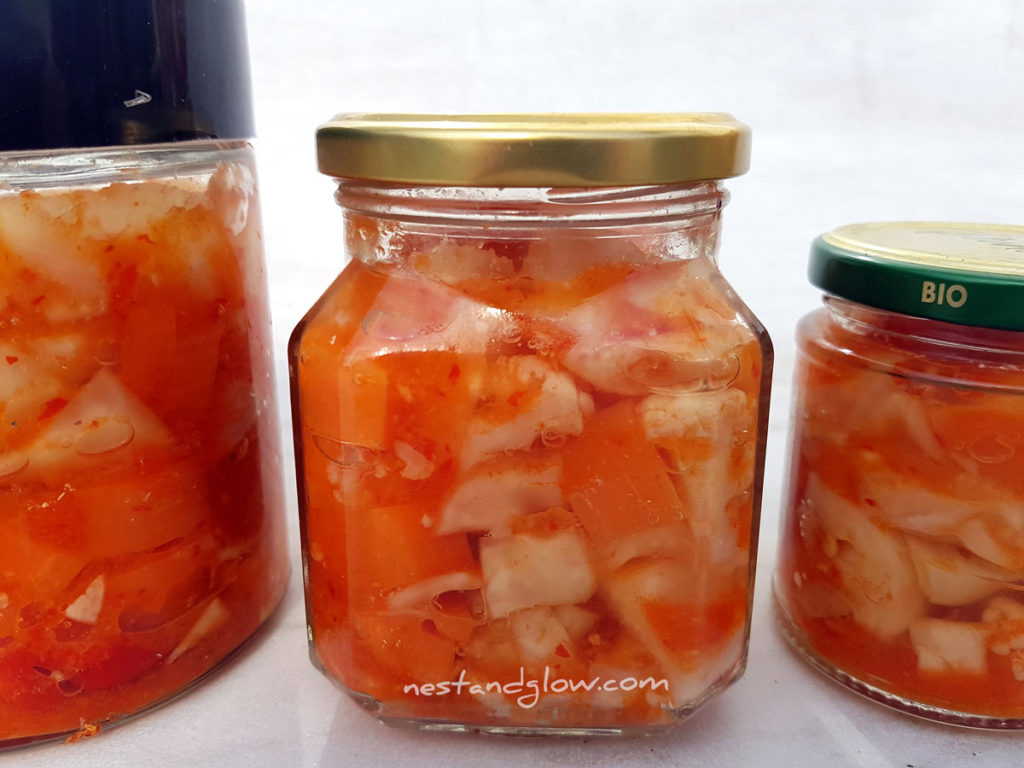
Quick Check, do you need supplements on a vegan diet?
Essential fatty acids, if you don’t have about 12g of plant omega 3 (chart at top of the page to check how much you get) then you should take algae oil.
Vitamin K2, if you don’t eat fermented and non-pasteurised foods several times a week you will need a vitamin K2 supplement.
Iodine, if you don’t eat seaweed several times a week (only a few grams a day is enough) or iodised salt you will need iodine.
Vitamin D, if you don’t get regular sun exposure or eat foods fortified with vitamin D (mushrooms, plant milk, cereal) you will need a vitamin D supplement.
B12, if you don’t consume mainly organic veggies that still have soil on (although you wash off the soil before eating but some b12 microbes remain) or don’t eat b12 fortified foods (yeast extract, nutritional yeast, plant milk) then you will need b12 supplementation.
Iron, it’s easy enough to get enough plant iron on a vegan diet to meet the RDA for vegan men of 14.4 mg for adults and post-menopausal vegan women if you eat a wide variety of plant foods.
But premenopausal vegan women need 32.4 mg a day and could benefit from using a lucky fish or similar to create iron high water to meet the RDA. Too much iron can cause health issues so it’s important to not consume too many iron supplements. I love this iron fish as it lasts for 5 years and reduces all the waste plastic and transportation you get with iron water supplements.
Calcium, there are plenty of plant sources of calcium. Eating a wide variety of plant wholefoods you can get the RDA of 1000mg, use the diagram and table earlier to check your diet.
Zinc, plenty of plant sources and possible to get the RDA with a good plant based diet. Check the table above to make sure you’re getting enough.
Final Notes on Vegan Supplementation
It’s important to know what foods you need to eat on a vegan diet and if you fall short to supplement.
Not all deficiencies are immediately apparent as the body can become depleted over time. If you’ve been on a vegan diet for less than a year you could be depleting levels of vitamins without any symptoms.
All of these amounts are just a guideline as absorption does depend on the person and what else they eat. Calcium absorption can be helped by orange juice and zinc absorption by protein.
The amounts above are for adults. Pregnant or breastfeeding women should have more but always get expert advice from a doctor.
Author Notes On Vegan Supplementation
I’ve been vegan for over 30 years. I do supplement with algae oil, B12 spray and a bone supplement in the winter (that contains vitamin D3, K2 and calcium) but not religiously.
By having a healthy plant based diet that includes lots of leafy greens, fruit and veg, raw unprocessed fats, seaweed and fermented foods I’ve not been deficient in anything as I approach 40.
As your age changes so do your nutritional needs so you should always be on the lookout for symptoms and get your levels checked if you have any concerns.
Let me know in the comments below what your experiences are with supplements on a vegan diet and any knowledge you would like to share.
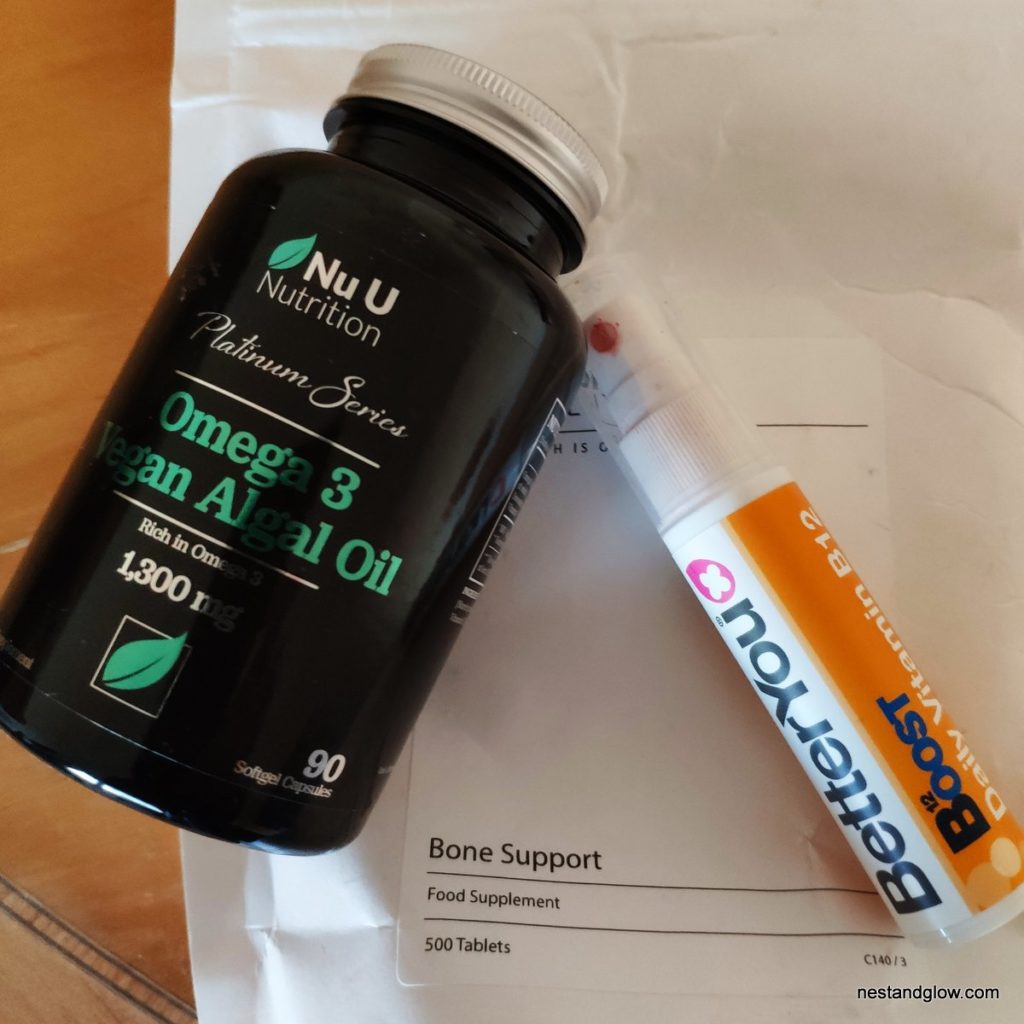

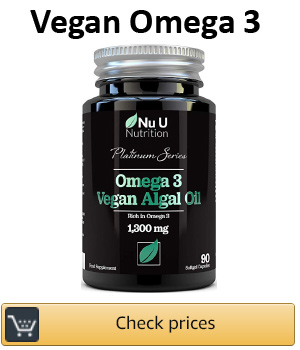
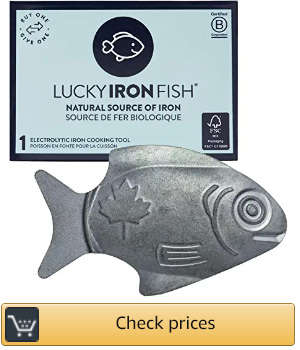
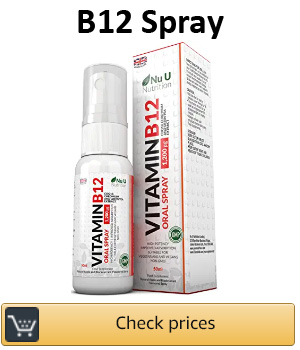
Best article ever.
Thanks for all the info, all very interesting. Thank you xx
Thanks so much, glad you liked this article on vegan nutrition and vegan vitamins / minerals.
Where do you get your bone support?
It was just a generic brand from
amazonan online shop. As long as it’s passed EU and UK rules I do think lots of brand name vitamins you’re just paying for the marketing and name.God, I don’ t take any supplements…I might need some. This article is a science for itself.
I didn’t for many years on a vegan diet. But after looking into it I did notice a few things I was definitely lacking in. It’s best to get them from your diet, but just to make sure a few pounds a week on some supplements I feel is a worthwhile investment. This is using today’s advise that might change but still I think it’s worth following.
Thank you for these informations! I definitely have symptoms for nutritional deficiencies. This is partly my fault for not being careful enough, but also for misinformation, i knew about b12 and vitamin d, but there are some other vitamins nobody ever talk about. I honestly have no idea vegans could lack k2 as well, and when i checked the rda for iron it said 14mg/day without specifying the value for women with period. I have recently started taking dha and essential aminos supplements. I had my blood tested (but not for nutriments, just the basic stuff) and my calcium and iron value were okay, while b12 was law. Now i eat 1g of spirulina a day that satisfy the daily intake of b12 and iodine.
I may need vitamin k2